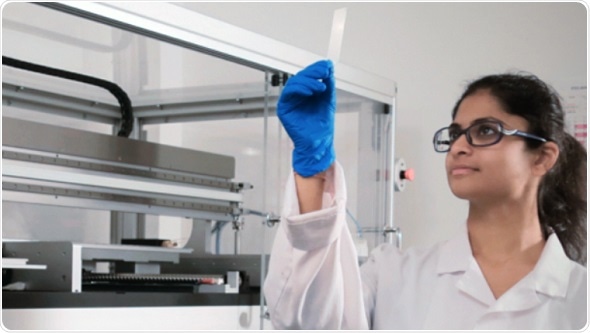Arrayjet, the Scottish-based microarray instrumentation company, has secured a GBP250,000 contract to provide the Swedish SciLifeLab - the national hub for molecular bioscience in Sweden - with microarray technology to provide further analytical information for mapping the human protein atlas.

Arrayjet microarray technology which is now used widely used in research labs across the globe
SciLifeLab is a national hub for molecular biosciences in Sweden, created by four universities in Stockholm and Uppsala: Stockholm University, Karolinska Institutet, KTH Royal Institute of Technology and Uppsala University. SciLifeLab will use Super Marathon to validate the analysis of bio molecules such as proteins, which are exposed to hundreds of experimental conditions on a single chip using infrared imaging.
One of the key roles for SciLifeLab is to support the Swedish research community by providing access to cutting edge instrumentation and scientific expertise. This is achieved through ten infrastructure platforms with nearly 40 research facilities, supported by over 150 research groups and collaborative networks, hosted by multiple Swedish universities.
Arrayjet initially provided microarray instrumentation to KTH nine years ago which have been used extensively for production of arrays that have been utilised for the validation of tens of thousands of antibodies within HPA and for many projects within the Autoimmunity profiling facility. With the advances in technology and the demand for a higher density of proteins and higher throughput of samples the newly installed Arrayjet Marathon at SciLifeLab provides the means to significantly enhance not only the throughput but also the robustness.
The SciLifeLab Autoimmunity Profiling facility, hosted by KTH, will use Arrayjet instrumentation together with the thousands of protein fragments produced by the Human Protein Atlas to generate high-density protein microarrays for the profiling of autoantibody repertoires in biofluids and validation of affinity reagents.
Iain McWilliam, CEO, Arrayjet comments:
SciLifeLab is pushing the boundaries of our understanding in the development and complexities of the human proteome and I’m delighted that Arrayjet is helping to advance that understanding, by giving the researchers the means through our instrumentation.”
The great resource of affinity reagents powering the affinity-proteomics facilities at SciLifeLab traces its origin back to the Human Protein Atlas. Creation of the Human Protein Atlas started back in 2003 with the aim to map all the human proteins in cells, tissues and organs, using the integration of various technologies including anti-body-based imaging, transcriptomics, proteomics and systems biology.
Today the atlas comprises of six sub-atlases mapping the location of over 17,000 proteins and their impact in cancer, presence in blood and brain, and context in metabolic pathways. All the data in the atlas is provided as an open access knowledge resource for scientists in in academia and industry alike.
Currently arrays are generated with 42,000 different human protein fragments representing more than 18,000 unique human protein coding genes, enabling SciLifeLab to offer proteome-wide screening for autoantibody reactivity on large microarrays, using Arrayjet Super Marathon to enable more efficient and accurate printing under highly controlled environmental conditions.